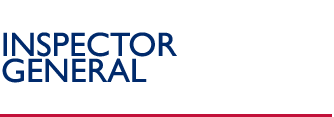About OIG
The USAID Office of Inspector General (OIG) was established on December 16, 1980 by Public Law 96-533 which amended the Foreign Assistance Act of 1961. On December 29, 1981, the President signed the International Security and Development Cooperation Act of 1981, bringing the USAID Inspector General under the purview of the Inspector General Act of 1978.
On November 29, 1999, the President signed into law the Admiral James W. Nance and Meg Donovan Foreign Relations Authorization Act, Public Law 106-113, mandating that USAID/OIG provide inspector general services to the African Development Foundation (ADF) and the Inter-American Foundation (IAF). On January 23, 2004, by direction of Public Law 108-199 (The Consolidated Appropriations Act of 2004) USAID Inspector General was also appointed as the Inspector General for the Millennium Challenge Corporation (MCC) created under the Act. Further, the OIG is authorized by statute to also provide services to the Overseas Private Investment Corporation.
The Inspector General Act of 1978, as amended, authorizes USAID's OIG to conduct and supervise audits and investigations of the programs and operations of the organizations it is responsible for. In addition, the Act mandates that the OIG provide leadership and coordination for these client organizations and recommend policies for activities designed to: (1) promote economy, efficiency and effectiveness, and (2) prevent and detect fraud and abuse. The Inspector General is responsible for keeping the head of the respective client organization and the Congress fully informed about problems and deficiencies in the organization's programs and operations, as well as the necessity for, and progress of, corrective actions.
Considering the unique structure and operation of the newly established Millennium Challenge Corporation, the OIG has established a fourth Assistant Inspector Office to specifically oversee the MCC's activities. The areas of responsibility of the four Assistant Inspectors General for Audit, the Millennium Challenge Corporation, Investigations, and Management are shown below.
Areas of Responsibility
Audit: The Assistant Inspector General for Audit is responsible for supervising performance of audit activities relating to worldwide foreign assistance programs and agency operations of USAID, ADF and IAF. Audit activities include performance audits of programs and management systems, financial statement audits required under the Chief Financial Officers Act, and financial related audits of grantees and contractors.
Millennium Challenge Corporation: The Assistant Inspector General for the Millennium Challenge Corporation is responsible for oversight of the Corporation's programs and operations worldwide. While it will establish performance and financial audit divisions, it will coordinate with the Assistant Inspector General for Investigations for investigative support and with the Assistant Inspector General for Audit for supplementary audit support.
Investigations: The Assistant Inspector General for Investigations has responsibility for supervising the performance of investigative activities relating to foreign assistance programs and agency operations. Investigations of criminal, civil, and administrative violations cover all facets of worldwide operations for OIG's client agencies.
Management: The Assistant Inspector General for Management is responsible for managing all the administrative activities for the OIG's Washington D.C. and overseas offices. Administrative functions include human resources, budgeting, contracting, and information management.
Back to Top ^
|


